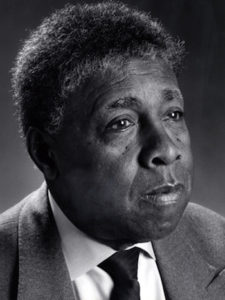
Harold Amos
*Harold Amos was born on this date in 1918. He was a Black microbiologist and professor.
He was a native of Pennsauken, N.J. Amos graduated from Springfield College in Springfield, Mass, with a baccalaureate, in 1941. He had gone there on an academic scholarship, which few Blacks received then. He served in the U.S. Army Quartermaster Corps in Europe during World War II.
Following this service, he earned an MA from Harvard University and his Ph.D. from the HMS Division of Medical Sciences in 1952. From 1951 to 1952, he was a Fulbright scholar at the Pasteur Institute in Paris, and, in 1954; he joined the Medical School faculty as an instructor in the Department of Bacteriology and Immunology. From 1968 until 1971 and from 1975 until 1978, he served as chair of the department (now the Department of Microbiology and Molecular Genetics).
He was named the Maude and Lillian Presley professor of microbiology and molecular genetics in 1975 and became emeritus in 1988. He also served as chairman of the Division of Medical Sciences from 1971 until 1975 and from 1978 until 1988. "Dr. Amos has been an inspiration, mentor, and career counselor for young scientists and physicians-in-training for decades," said John Mekalanos, chair of Microbiology and Molecular Genetics. "He has been the consummate teacher: available, approachable, knowledgeable, and wise. Members of the Department of Microbiology and Molecular Genetics are forever grateful that Harold Amos has been our adviser, colleague, teacher, and friend."
Amos devoted much of his time and effort to supporting and encouraging minorities in biomedical science and medicine. He supported the establishment of the Hinton-Wright Society in 1983, a graduate student body at the Medical School and HSDM that supports and encourages minority scientists in the Boston medical community.
In 1999, he was awarded the first annual Harold Amos Faculty Diversity Award for his continuous contributions to school diversity efforts. The Harold Amos-Genevieve McMillan Scholarship Fund was established in 1999 to encourage black students to pursue medical careers. In 2001, Amos's friends and former students established the Harold Amos Fund, an endowed graduate student fellowship for students in the Department of Microbiology and Molecular Genetics. On the national level, for more than a decade, he directed the Minority Medical Faculty Development Program of the Robert Wood Johnson Foundation, and he was instrumental in creating minority programs at the National Institutes of Health and the Federation of American Societies for Experimental Biology.
Amos was among the first two recipients of the Dr. Charles R. Drew World Medical Prize, awarded by Howard University to distinguished minority biomedical scientists. He was also awarded the Public Welfare Medal of the National Academy of Sciences in 1995, a Doctor of Science honorary degree from Harvard University in 1996, and a Harvard University Graduate School of Arts and Sciences Centennial Medal in 2000. He was a fellow of the American Academy of Arts and Sciences and, in 1991, was elected a fellow of the American Association for the Advancement of Science and a member of the Institute of Medicine. He also served on the President's Cancer Panel and the National Cancer Advisory Board and, for more than 30 years, served in various leadership positions with the American Cancer Society.
He was a Harvard faculty member for nearly 50 years and made research contributions to animal cell culture, bacterial metabolism, and animal and bacterial virology. He taught at Harvard Medical School for nearly fifty years and was the first Black department chair of the school. He also inspired hundreds of minorities to become medical doctors. He was a resident of Beacon Hill, Boston. Harold Amos died on Feb. 26, 2003. He was 84.
Harold Amos Medical Faculty Development Program
714 N. Senate Avenue, EF 212
Indianapolis, IN 46202